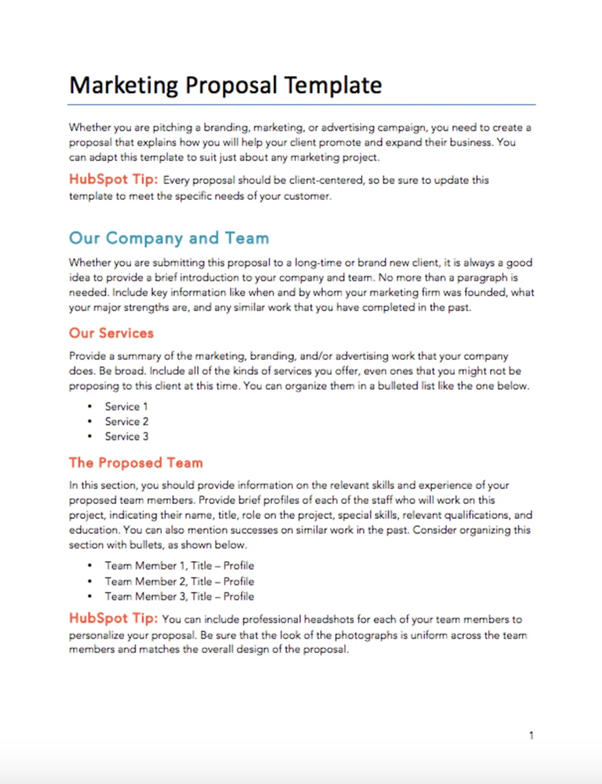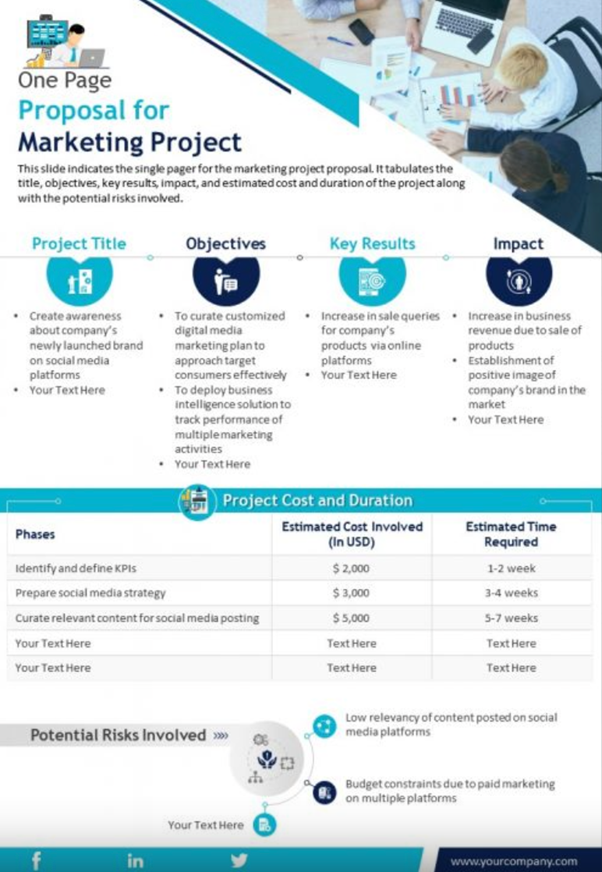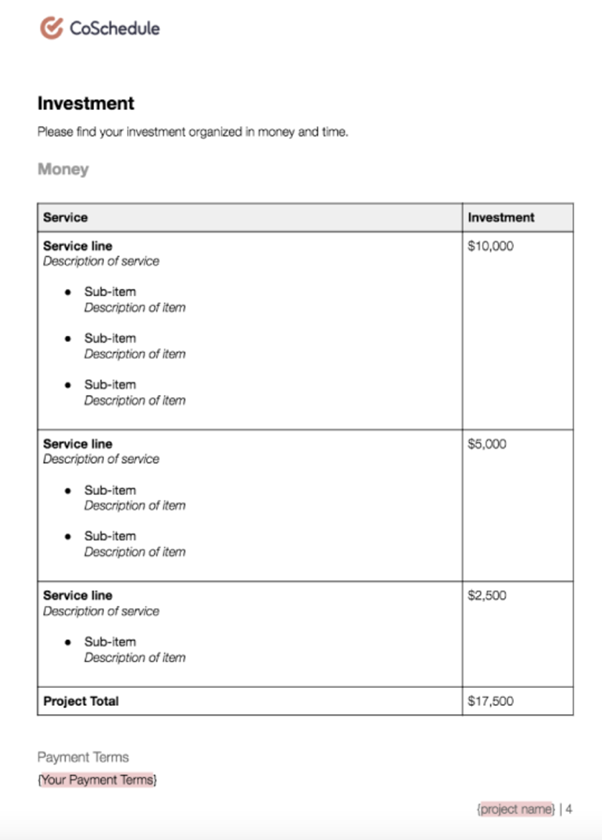In the fast-paced business world, creating a compelling marketing proposal is like mastering the art of convincing others effectively. It’s a skill that can mean the difference between your ideas flourishing or fading into obscurity.
As the great marketer Peter Drucker once said, “The aim of marketing is to know and understand the customer so well that the product or service fits them perfectly and sells itself.”
As beautiful as it sounds, it emphasizes the importance of customer-centricity in marketing proposals, thus, highlighting the need to deeply comprehend the target audience’s needs and preferences.
Effective leaders in growth marketing recognize the pivotal role of marketing in strategic business decisions. To navigate their organizations toward optimal outcomes, they rely on a comprehensive breakdown of marketing aspects.
This highlights the critical significance of marketing proposals during budget and strategy discussions. Whether your aim is to persuade internal decision-makers or pitch services to clients, these proposals serve as indispensable tools. They provide the necessary insights to inform key stakeholders, allowing you to make informed choices that steer the organization in the best possible direction.
Now, the question arises — How can you create a proposal that not only seamlessly fits your audience like a glove but also propel them into action? Within the intricate tapestry of marketing, this challenge demands a delicate balance of strategy and creativity.
Before we move forward, let us have a closer look at what exactly a marketing proposal is.
What is a Marketing Proposal?
A marketing proposal is a detailed document that outlines a marketing project’s scope and budget, shared with important stakeholders. The primary objective of this proposal is to obtain the necessary approval to initiate the implementation of the outlined plan.
Requiring your team to reinvent the wheel every time a formal marketing proposal is needed can be inefficient and time-consuming. However, there is a way to streamline the process by adopting a repeatable approach to proposal creation.
Here’s a step-by-step process:
Step-1: Qualify and Understand Client Needs

When it comes to crafting an impactful marketing proposal, one of the crucial initial steps is to understand the needs of your client or internal stakeholders. This process involves conducting a comprehensive discovery session, during which you actively engage in open and meaningful dialogue.
By asking insightful questions and genuinely listening to their responses, you can gather valuable information that will guide the direction of your proposal.
During the discovery session, take the opportunity to explore their goals, aspirations, and pain points. Seek to understand their target audience, industry landscape, and any unique challenges they may be facing. By delving deep into their needs and expectations, you can gain the insights necessary to tailor your proposal specifically to their requirements.
This thorough understanding allows you to align your proposed strategies, tactics, and solutions with their goals. Remember, effective communication and active listening are key during the discovery session. Take notes, ask follow-up questions, and seek clarification when needed.
By actively engaging with your clients or stakeholders, you not only gain a comprehensive understanding of their needs but also foster a collaborative relationship, setting the stage for a successful marketing proposal that meets and exceeds their expectations.
Step-2: Develop a Detailed Plan of Action Aligned with the Client’s Goals

In order to streamline the creation of your marketing proposal and ensure its prompt delivery, it is highly beneficial to leverage the use of readily available marketing proposal templates. These templates serve as valuable tools that provide a structured framework for organizing your ideas and presenting them in a polished and professional manner.
By using a template, you can bypass the time-consuming process of starting from scratch and instead focus on customizing the content to align with the specific needs and requirements of your client or stakeholders.
The template acts as a guide, offering sections and headings that prompt you to include essential information, such as an executive summary, objectives, target audience analysis, proposed strategies, budget breakdown, and expected outcomes.
Not only does using a template save you valuable time and effort, but it also ensures consistency and clarity throughout your proposal. The standardized structure and format of the template enable you to present your ideas in a coherent and organized manner, making it easier for your audience to navigate and comprehend the content.
Step-3: Streamline Proposal Creation with Marketing Proposal Templates

Once you have gathered the necessary insights, the next step is the transition into the development of a detailed plan of action. This plan serves as a roadmap that aligns with your overarching vision for accomplishing the client’s goals and objectives.
To create an effective plan, you need to carefully consider the strategies, tactics, and resources required to execute the marketing campaign successfully.
Once you have identified the optimal strategies, break down the plan into actionable steps. Provide a step-by-step breakdown of the activities that need to be executed, ensuring that each task is clearly defined and assigned to the relevant team members. Establish realistic timelines for each activity, taking into account dependencies and potential roadblocks that may arise along the way.
A well-structured plan not only showcases your expertise but also instills confidence in the client. It demonstrates that you have thoroughly analyzed their needs and devised a thoughtful and strategic approach to address them. By presenting a detailed plan of action, you convey professionalism, competence, and a clear understanding of how your proposed strategies will contribute to the client’s success.
Now that you understand what a marketing proposal is, the next step is to make one. But wait! Before planning a marketing proposal, let us have a look at some of the successful proposals that have yielded amazing results.
How to make Successful Marketing Proposal Templates to Drive Business Growth?
A well-crafted proposal is concise yet comprehensive, providing the necessary information to convey your value proposition effectively.
Having said that, merely sending a proposal without a corresponding presentation, whether conducted in person or over Skype, undermines the selling process. You must take the lead in showcasing your expertise and persuading the stakeholders.
Here are some examples of successful marketing proposals:
- HubSpot’s Free Marketing Proposal for PDF & Word- for Streamlined Proposal Creation

HubSpot offers a ready-to-use template designed to streamline the proposal creation process and help professionals present their marketing strategies in a polished and professional manner. It includes sections outlining the client’s goals, target audience, competitive analysis, marketing tactics, timelines, and budget considerations. One of its key advantages is its user-friendly format.
The document is available in both PDF and Word formats, allowing you to choose the one that suits your preferences and editing capabilities. Whether you prefer to work with a pre-designed PDF or prefer the flexibility of editing in Word, this template caters to your requirements.
With HubSpot’s Free Marketing Proposal template, you can save time and effort in creating a professional proposal that impresses your clients or internal stakeholders. It also allows you to present your marketing ideas with clarity, conciseness, and visual appeal. This, in turn, increases your chances of securing buy-in and driving the success of your marketing initiatives.
- SlideTeam Marketing Proposal (One Page Infographic)- for Simplifying Complex Information

SlideTeam offers a unique and innovative solution with their Marketing Proposal (One-Page Infographic). This visually appealing and concise template condenses the essential elements of a marketing proposal into a single, impactful infographic. It allows you to present your marketing strategies, goals, target audience, key messages, and anticipated outcomes in a visually engaging format.
The best thing about the template is that it maximizes the power of visual storytelling. So, you can capture the attention of your clients or stakeholders and convey your message with clarity and impact. With this one-page infographic, you can effectively communicate your value proposition, unique selling points, and competitive advantage.
The infographic format allows you to present complex information in a concise and digestible manner, making it easier for your audience to understand and retain the key points of your proposal.
- CoSchedule Marketing Proposal Template (Investment Section)- for Clear and Organized Budgeting

CoSchedule offers a comprehensive Marketing Proposal Template with a dedicated Investment Section, allowing you to present your budgetary requirements and financial projections in a clear and organized manner.
You can outline the resources and costs associated with your proposed marketing campaign. It provides a structured format to showcase your investment strategy, including expenses related to advertising, content creation, technology tools, and team resources.
With this template, you can effectively communicate the anticipated return on investment (ROI) and demonstrate the value of your marketing initiatives.
By presenting a detailed breakdown of the financial aspects, you instill confidence in your clients or stakeholders and emphasize the strategic planning behind your proposed campaign.
This template empowers you to showcase the financial viability and profitability of your marketing strategies, ultimately increasing your chances of securing the necessary funding and support.
Here are some of the best marketing proposals. Remember, a successful marketing proposal is not just about presenting creative ideas. It is also about providing a well-thought-out and actionable plan that is grounded in expertise, supported by data, and adapted to the evolving digital landscape!
With the recent introduction of Google Analytics 4 (GA4), you have to address the migration to this new analytics platform in your proposal. By considering the impact of GA4 migration on tracking and measurement, you demonstrate your adaptability and understanding of the latest industry developments.
So how to come up with marketing proposals like the ones we discussed above? Let’s find out.
How to Create Successful Marketing Proposals?

Typically, the layout of a marketing proposal maintains a consistent structure regardless of the industry. Although the specific strategies may vary significantly, such as between a law firm’s marketing proposal and an e-commerce store’s integrated marketing strategy, the overall outline of the proposal remains quite similar.
Here are a few things you can do to make your proposal more effective:
- Uncovering Client Insights: Delving into Their Needs
Through client research, you can create a marketing proposal that resonates with the client, speaks to their specific needs, and positions your offerings as the perfect fit.
It allows you to showcase your understanding of their pain points and present a well-crafted plan that leverages your expertise to achieve their desired outcomes.
These are a few things to keep in mind while trying to identify your clients.
- Gather comprehensive information about their industry, including trends and competitors.
- Understand their specific products or services, as well as their financial situation.
- By delving into their industry, you can gain insights into the challenges they may be facing and identify their pain points.
By showcasing how your solutions directly address their challenges, you demonstrate the value you bring to the table and build trust with the client.
- Service Scope: Defining Your Marketing Magic
The Scope of Work section of your marketing proposal serves as a crucial component in setting expectations and ensuring a mutual understanding of the services you will provide.
It demonstrates your expertise and professionalism while giving the client a clear picture of how you will support their marketing objectives.
For instance, if you’re presenting a social media marketing proposal, your Scope of Work could encompass various activities such as creating a comprehensive social media content calendar, managing and scheduling posts across different platforms, and analyzing social media metrics to measure the effectiveness of the campaign.
Here is how you can do it:
- Clearly outline the Scope of Work section in your marketing proposal, detailing the specific services you will provide.
- Highlight the marketing tasks that the client may lack the time or resources to handle themselves.
- Customize the Scope of Work to suit the specific requirements of the client, considering their industry, objectives, and desired outcomes.
- Clearly articulate the deliverables and activities included in the Scope of Work, such as creating content calendars, managing social media posts, or analyzing metrics.
- Ensure that the Scope of Work demonstrates your understanding of the client’s needs and provides a clear roadmap of the marketing tasks you will undertake on their behalf.
This section outlines the specific services you will provide to the client and explains how you plan to deliver them. The purpose of the Scope of Work is to clearly define the marketing tasks that the client requires assistance with, as they may not have the necessary time or resources to handle these tasks themselves.
- Timely Deliverables: Making Promises You Can Keep
When prospective clients evaluate marketing proposals, one key factor they consider is the projected time frames for deliverables. They want to know how long it will take for you to complete specific tasks and provide the desired outcomes.
To address this, it is crucial to provide realistic estimates that accurately reflect the time required for each task.
For example, in a web development proposal, you may need to create a responsive website design, develop custom functionalities, and perform rigorous testing before launching the final website. Each of these tasks requires a certain amount of time and effort. By providing estimated time frames for these deliverables, you give the client a clear understanding of the project timeline and set realistic expectations.
By including realistic time frames in your marketing proposal, you demonstrate your commitment to delivering quality work within a reasonable timeline.
- Transparent Pricing: Costs and Terms That Speak Loud
This section helps establish transparency and sets expectations for both you and the client. By including specific details, you ensure that everyone involved is on the same page regarding the financial aspects and the working arrangements. Here is a step-by-step process of how to do it:
- Specify the pay rate for your services, whether it is based on words, a weekly rate, or a flat/hourly rate.
- Outline the payment requirements, including any deposit or full payment terms.
- Mention the work location arrangements, specifying whether it is on-site or remote collaboration.
- Incorporate guarantees, such as satisfaction guarantees or performance-based assurances.
- Clearly state the conditions under which these guarantees apply.
- Address circumstances that may lead to contract termination, establishing a framework for handling unforeseen situations and providing protection for both parties involved.
By clearly outlining the estimated costs and terms in your marketing proposal, you establish transparency, build trust, and ensure that everyone is on the same page. This clarity and open communication contribute to a smooth and successful working relationship.
- Measuring Success: Metrics that Matter
When creating your marketing proposal, it’s important to show that you care about measuring the outcomes of your efforts. Explain the specific ways you will track and evaluate the success of the marketing campaign.
This can include looking at metrics like how many people visit the website through organic search or paid advertisements, how engaged people are on social media, and how many conversions (such as purchases or sign-ups) occur as a result of the marketing activities.
By highlighting these metrics, you demonstrate that you believe in making decisions based on data and that you take responsibility for the results. This shows your potential clients that you are dedicated to achieving tangible and measurable outcomes through your marketing strategies.
Here are some of the areas where you can improve to make your marketing proposal a great success. In the next section, we have given some tips that will be helpful in making a great marketing proposal!!
9 Proven Tips to Write a Marketing Proposal

Crafting a compelling and effective marketing proposal requires a thoughtful approach and attention to detail. Here are some tips that can help you:
- Create an impactful cover page that leaves a positive first impression.
- Present a comprehensive executive summary that includes the key insights from your discovery session with the client.
- Clearly outline the client’s goals and challenges, and introduce your proposed solutions to address them.
- Elaborate on the specific strategies and tactics you will employ to help the client achieve their goals.
- Summarize the scope of work in a concise and transparent manner.
- Explain how you will measure success by outlining the metrics that will be used to evaluate the effectiveness of the marketing campaign.
- If the proposal is intended for a client, emphasize why your agency is the ideal choice for the job and highlight your unique strengths and capabilities.
- Provide evidence of your past successes through case studies that demonstrate your ability to deliver results.
- Clearly outline the terms and conditions or contract that will govern the working relationship between you and the client.
By following these valuable tips, you can create a persuasive and well-structured marketing proposal that effectively communicates your ideas, demonstrates your expertise, and convinces your audience of the value you bring.
Concluding Words
Crafting an effective marketing proposal is an art that requires a blend of creativity, strategy, and a deep understanding of your audience.
Remember, the key lies in truly understanding your audience and tailoring your proposal to meet their unique needs. Research their pain points, showcase your expertise, and highlight the solutions that will propel their business to new heights.
But don’t stop there – structure your proposal thoughtfully, incorporating visual elements and evidence-backed data to make it irresistible.
The secret ingredient is setting realistic expectations and being transparent about what you can deliver. Honesty builds trust, and trust is the foundation of successful partnerships. So, lay it all out on the table – the benefits, the limitations, and the timeframe – to create a proposal that is grounded in reality and sets you apart from the competition.
Contact us for an excellent marketing proposal for your business today!



